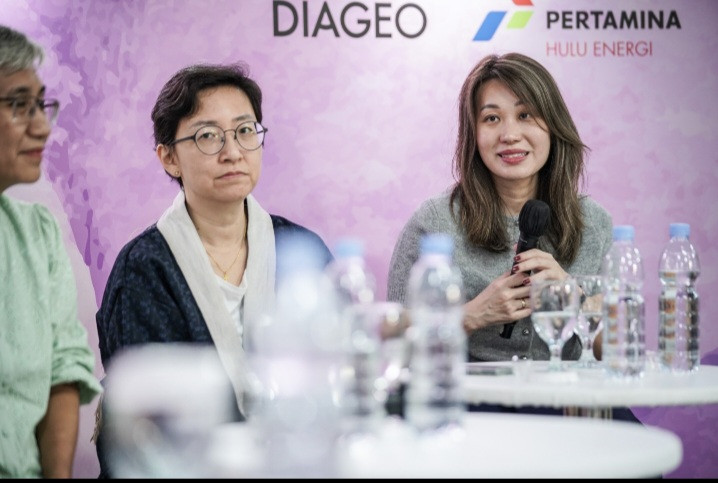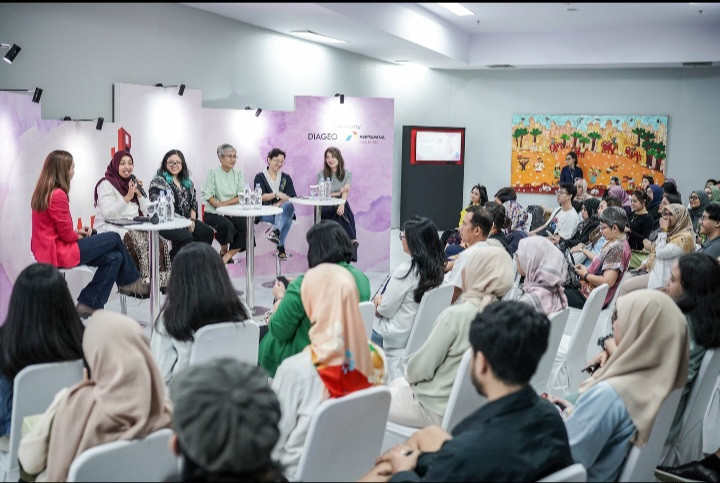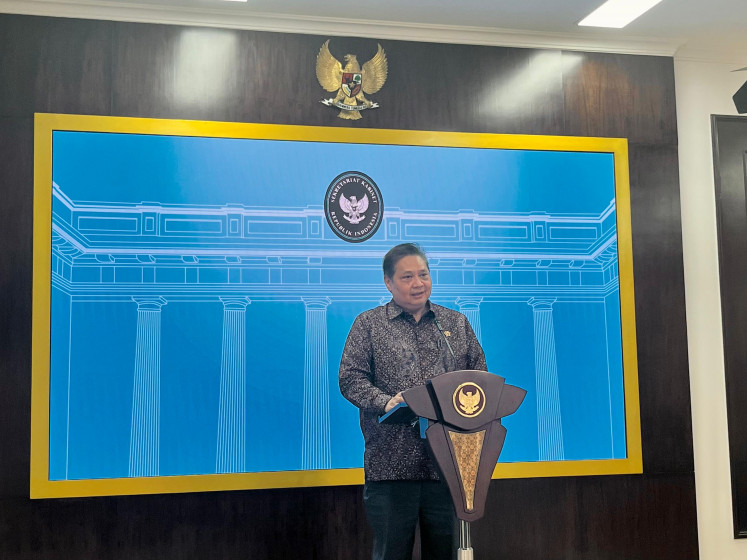Popular Reads
Top Results
Can't find what you're looking for?
View all search resultsPopular Reads
Top Results
Can't find what you're looking for?
View all search resultsWomen at work: how Diageo Indonesia combats gender discrimination through inclusivity
Change text size
Gift Premium Articles
to Anyone

W
hile Indonesia has seen an increase of women in leadership positions in recent years, gender disparity is also quite prevalent despite the advances that have been made in the workplace.
According to statistics from the Central Statistics Agency (BPS), from 2015 to 2020, the number of women in managerial positions have increased from 22 to about 33 percent. Meanwhile, the global average of women in leadership positions is around 36 percent.
During the Game Changers talk show that was held on Saturday (18/05) at The Jakarta Post office, the panel consisting of women across different industries revealed that in terms of leadership, women make up about 33 percent in the corporate world, 17 percent in the gaming industry, and a staggering 9 percent in comedy.
Based on the aforementioned statistics, corporations have been able to lead the change. For instance, five in nine of the leadership team at Diageo Indonesia are women, a statistic that can be seen as a beacon of light for other multinational companies.
Victoria Aswien, as the human resources director at Diageo Indonesia was among the list of panelists able to delve more into how gender representation can influence a workplace. She was in the company of Shelly Suryadi, human resources director of Deloitte Indonesia; Aninditta Savitry, with experiences in management consulting and banking; Galuh “Sasha” Elsa, a narrative writer for Toge Production; and Sakdiyah Ma’ruf, a stand-up comedian.
“In my previous career, I think that when you’re a woman, and you’re in Human Resources (HR), the perception (to the gender) is that, ‘oh you’re very nice, you’re very soft, are you sure you can do the job?’,” she revealed about combating the stereotypes reserved for women. She added, “It’s just a perception but people really do look at the externalities.”
Victoria added that the perception for women in the alcohol industry is “tougher,” especially the fact that saleswomen have to look a certain way to be able to sell hard liquor. Aiming to break that perception, she emphasized that her company is more willing to hire and invest in female talents.
In terms of operations, Victoria relies on communication to be able to ensure that everyone in the company feels heard. She understood that by having a community for her employees to discuss about the kind of path they want in life, understanding the challenges is also an integral part of how they can move forward.
“Part of the solution is mentoring. People [within the company] have said that it feels like [they are] the only ones with this problem, but when the company builds a community for them, they can see that it’s a shared issue. So mentoring is a way for them to see hope, seeing this woman as a senior level manager, it’s doable,” she said.
Deloitte Indonesia also offers coaching sessions to their employees to ensure that they are being heard and taken care of. Shelly attested that based on her own experiences, the leaders in the company sees her as a person, regardless of her gender. She also said that everybody has an assigned coach to provide them with regular guidance, whether it is regarding personal and professional developments or concerns.
“My leaders also have strong belief that I can do anything that I work on, they really give me confidence to try my best. And so I do, and until now I'm still working. So barriers did exist for me, but it was intrinsic between my identity as a mother and my career,” she said on the importance of a supportive environment.
What further sets some companies apart is the amount of evidence integrated into its policies. More companies are trying to eradicate gender disparity in the workplace by changing company guidelines.
Aninditta said, “Life doesn’t happen that fast, we are living in a Darwinian evolution, so it's more that we are shifting, but we’ll get there. Slowly, consistently, moving, that is my message on policy.”
One that has been on the forefront of change is regarding the duration of parental leave. While the law in Indonesia guarantees new mothers maternity leave for a maximum of three months or about 13 weeks, Victoria informed that Diageo Indonesia went even further, by extending that period to 26 weeks.
Additionally, the company also grants four weeks of paternity leave. These policies are applicable not only for parents who are expecting biological children, but also for parents with adopted children.
Similarly, Shelly echoed that Deloitte Indonesia gives additional support to working parents through financial support for cesarean operations, access to lactation rooms, and parental leave for their children’s milestones – from graduation to musical recitals.
“For our women especially, we think that we shouldn’t penalize them for becoming mothers, they can be mothers and achieve their career goals, it shouldn’t be one or the other,” Victoria explained.
However, it doesn’t just stop there. The mentoring process for women integrated by Diageo is not just for new mothers, but also for others stepping up into a new phase in their lives. The conversation around the office may seem unconventional, however necessary for all.
“Now, we openly speak about many things that were previously considered taboo, like menopause and domestic violence for example. We feel that it’s something that needs to be discussed, and there should be a platform to support it. Our policies enabled people to talk and share about their struggles comfortably. This kind of environment helps our women, and maybe even the men, to become much better in what they do,” Victoria said.
By not shying away from topics that are usually not talked about in a company, Diageo Indonesia creates an inclusive atmosphere for everyone to be able to flourish at home and in the workplace. Like many other companies, the pandemic changed how they do business, especially with the work from home (WFH) phenomenon.
As the world adjusts to the new normal and companies are requiring their employees to come to the office five days a week, Diageo Indonesia broke the mold by adopting the new era with small steps. Allowing more flexibility, they only require three days in the office.
Victoria also attributed the flexibility to the increase in employees. This also leads Diageo Indonesia to be awarded as the Best Workplace Practices at the 2023 Global CSR and ESG Summit and Awards.
At the end of the day, Diageo Indonesia could be seen as an example of corporations that are committed to combating gender disparity in their workplace, putting the value of inclusivity at the core of their company operations.
“So at certain stages of my career I faced [gender discrimination], and I do kind of question myself. But in the end, what I learned is that I simply need to be better. Eventually I realize that what we deliver, the results, is not female or male, so consistency in terms of thinking I just need to deliver it with evidence,” she concluded.
HearHer is a special series from The Jakarta Post that aims to amplify the voices of Indonesian women, shedding light on their achievements, challenges and contributions toward shaping a more inclusive future.












